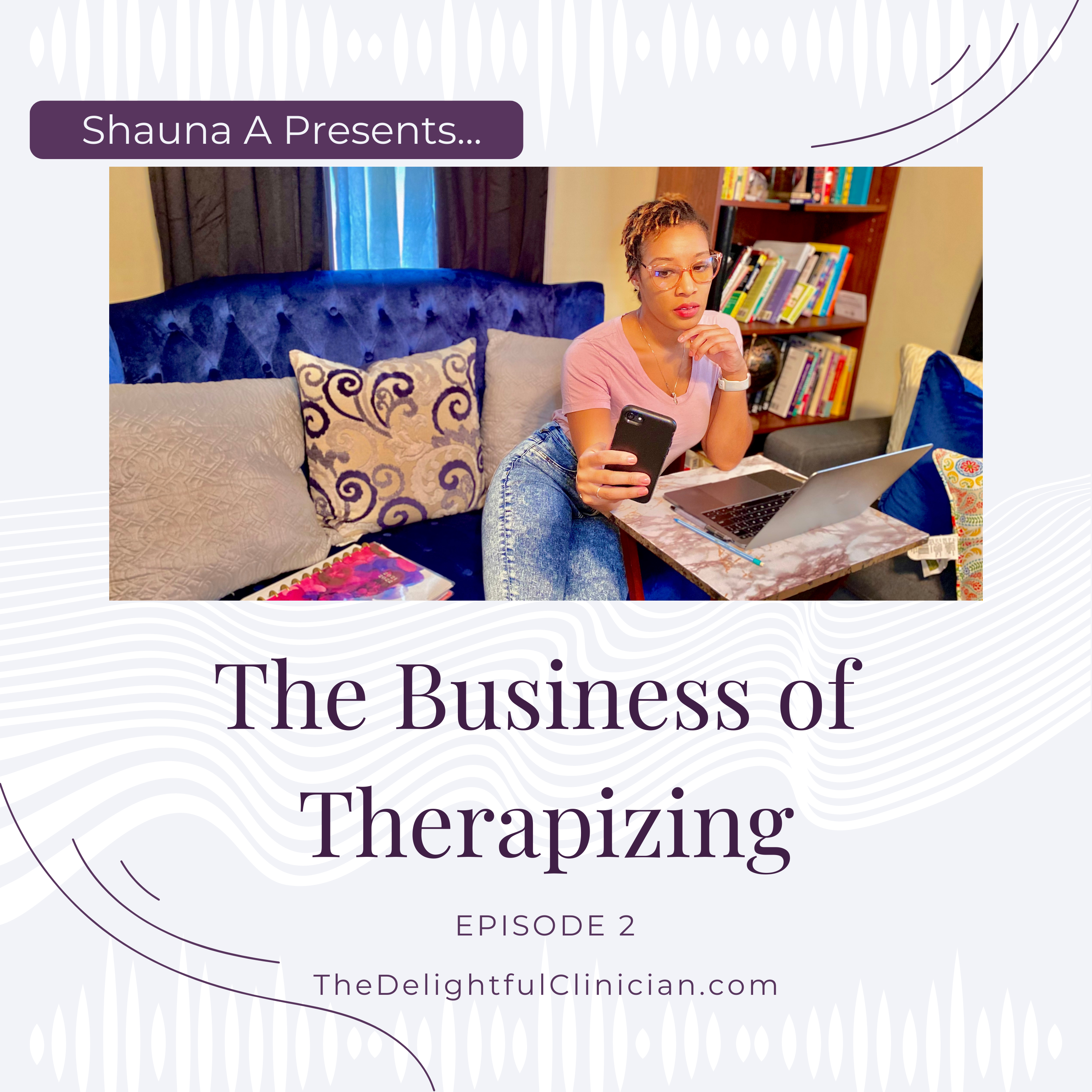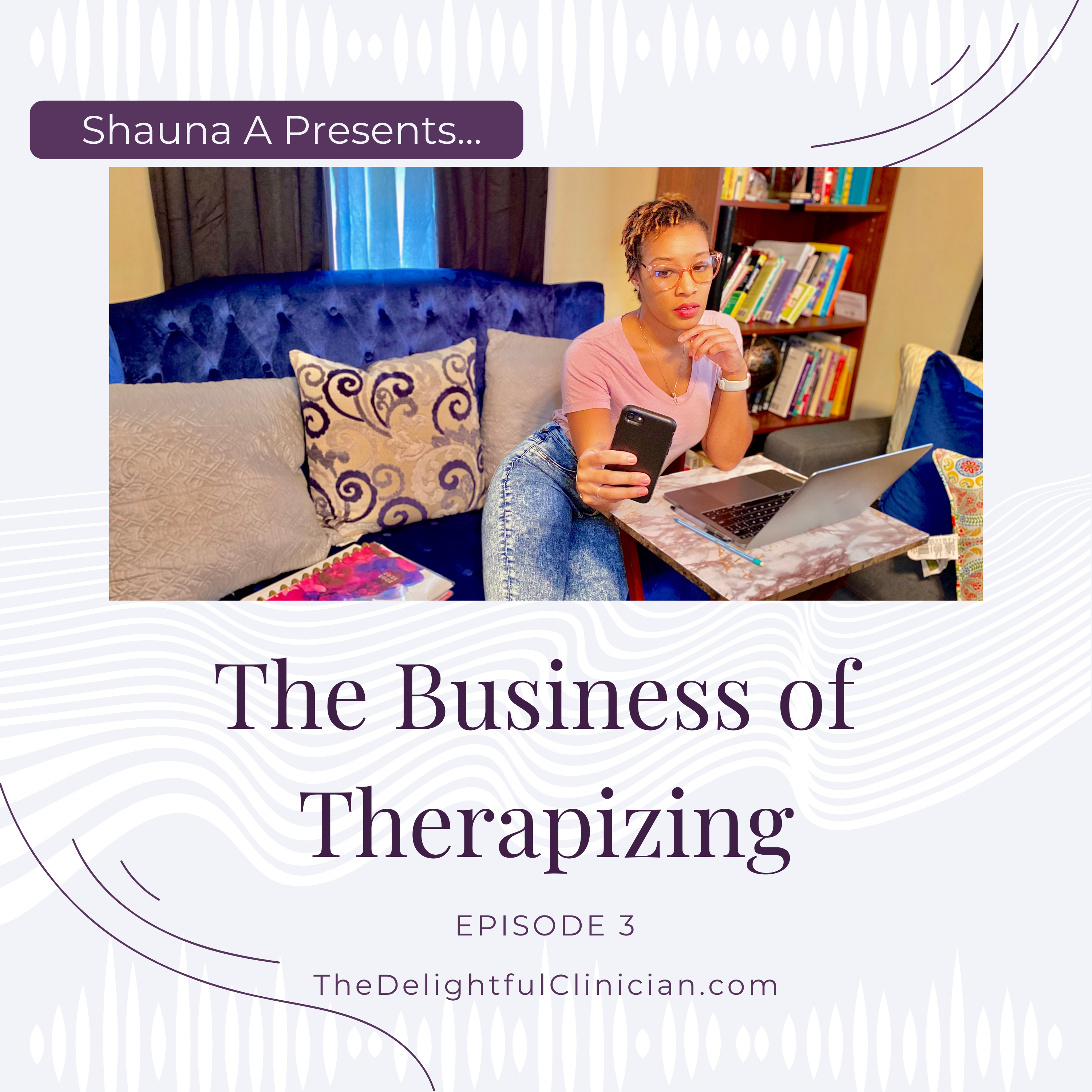Episode Transcript
Speaker 0 00:00:00 Hey, hey Shauna, a licensed clinical mental health counselor. This is the business of Therapizing podcast. The podcast where I teach clinicians how to build lucrative careers. This is episode two focused in, now here's the show.
Speaker 1 00:00:19 Oh,
Speaker 0 00:00:24 All right. All right. Right. So I've been talking about this enough and <laugh> it's time to talk about what is the focused in method and why I believe it's so important in building a lucrative career. So first I think we have to talk about how therapists go about building businesses because I'm coming from the standpoint that most of the time when clinicians enter school, they are usually thinking about how they want to utilize this information that they are about to learn. Because becoming a clinician, the master's level education is really specifically for the professional degree for you to utilize your degree in a certain way. You're already thinking about how you're going to be utilizing it and many clinicians are thinking that they are wanting to get into therapy. They are thinking that hey, I'm probably going to be in a private practice. I'm probably going to be running this show on my own.
Speaker 0 00:01:18 However, their schools, grad schools are not teaching clinicians how to be business professionals. They are teaching clinicians how to provide therapy and most of the time it's not even really how to, they're providing the very basics. This is what therapy is, these are the founding fathers and I put that in air quotes of therapy and these are their modalities. So a lot of times you're learning very general ways of providing therapy. Like you are gaining the experience of how to be a therapist over time, not necessarily when you're in grad school. And that is the grad school sense that they say that you know, really the time when you're in grad school should be learning the most about the field and you should be gaining the experience when you go out into the real world versus when you're sitting in the classroom focusing on how to build a business.
Speaker 0 00:02:21 But building the business is very important. And so what happens is that most clinicians get out of school without that additional information. And it's really unfortunate because it is something that is really close to what many of us want. So we're going to school, we're learning how to be clinicians, but we're not getting the business side, which is equally important. And I will say by this logic for grad schools, yes clinicians really do need to learn how to be therapist before they are trying to run a business. Otherwise, you end up in the position of a lot of these organizations where you're not really understanding the mechanics of both. And then you end up perpetuating the same harmful things that corporate mental health is already perpetuating at this point in time. But also clinicians need to know how to run businesses. So we're gonna break down some of that here in this episode. And why, again, I believe that focusing in is really helpful.
Speaker 0 00:03:24 So we are currently in a era where you can start up your business online and just run with it. And you know, if you think about things 30 years ago, 20 years ago, that was dang near impossible, right? Like back in the nineties, it wasn't as easy to market as it is today. You know, back in the nineties, marketing seemed almost impossible cuz there was these huge marketing forums and they would spend so much money taking out newspaper ads, taking out commercial spots and those kinds of things. And that just seemed unreachable for the average small business. But now as an online counselor, like you don't have to take out a commercial ad, you can put out an ad on social media, you can put out a Google ad if you wanted to. There's so many ways to reach people. You might not even need to put out ads.
Speaker 0 00:04:15 You can make sure that there is enough keywords in your websites and in the different spaces that you are and maximize your search engine opp optimization. So there has been such a huge shift on how to run a business that it is easier to start up a practice and get people walking in the door. I think the issue is not just getting clients because clinicians typically become very scared when it comes to marketing. I think we're also a little bit spoiled. Whereas like, you know, when we want clients we could put up a directory and say, Hey, I am, you know, taking on clients and we just cross our fingers and we hope that that directory works. The thing about it is that this could be like a recipe for a disaster because clinicians are almost spoiled in a way of getting clients and then they become really frustrated when they are able unable to get the right clients, the clients that they want to work with.
Speaker 0 00:05:18 And so essentially focusing in is taking that part, that understanding that it's not just getting people walking through the door, it's getting the people that are a fit for your scope of practice and a fit for your private practice that you are running. So how do you do that? Well, when you see online coaches and you see other online entrepreneurs working, you see a lot of talk about niche. So a lot of times in those online spaces people are talking about, oh, I have to find my niche. And what they're focusing on is finding their place, right? Like if you look at environmental science, niche is just like a animal's place in the environment, right? So you're looking for your place in the business world. Here's the thing, mental health clinicians already have a niche. Your niche is health and wellness. So you already have a place, but that niche is so huge, right?
Speaker 0 00:06:20 Because trainers fit into health and wellness, coaches can fit in health and wellness if they're a life coach, there's many people that fit into health and wellness. So that makes it incredibly broad. So what needs to happen there is that it needs to be broken down more. And this is where clinicians like totally go off the rails because anytime you ask a clinician what their niche is going to be, I'm gonna tell you eight out of 10 times that person is like, oh, my niche is adults, young adults, it's children, it's adolescents, people with depression and anxiety. And it's just like you have not broken that down any further. <laugh>, it's not as far as you think and you're still really, really, really broad. Focusing in is like taking a magnifying glass and putting it over all of those really broad topics that you're talking about and pinpointing a specific problem.
Speaker 0 00:07:17 And while yes, depression, anxiety, all of the diagnoses present as problems and issues, all of those people hold those problems and issues you, your niche is a specific problem. And so getting focused in, it's not the labels that we put onto those people, it is the problem that those people have that you are attempting to help them solve. So for example, I am a licensed clinical mental health counselor. I focus in on perinatal mental health and fertility impairment. And so when I look at my audience, my niche health and wellness, I am a mental health counselor and also I have a specialty of perinatal mental health and fertility impairment, but I get even more focused. The problem that I focus in on is well journeying through the spectrum of perinatal mental health and their ability to strengthen the bonds of the family that they are attempting to create.
Speaker 0 00:08:24 So when you think about that, it's very focused and this is how this is helpful. So when it comes to working with this particular group, I am already aware of the types of things that they come into or that they bring into therapy. Some of the things that my group might bring into therapy is family of origin issues, is making a connection with their new child, is working through birth, birth trauma planning, trying to conceive, struggling with fertility. All of those things are issues within that group. But now that I'm focused on strengthening bonds, I can focus on relational issues. I can focus on psychoeducation for this particular group so that they have what they need to strengthen bonds. It's so focused in that now I learn that I can create many different products around that, right? It's not just mental health, it's oh, this group may need evaluations.
Speaker 0 00:09:22 It's, oh, this group may benefit from a journal. Oh, this group may benefit from some psychoeducational courses to assist them in starting off this journey on a strong foot without getting burned out and overwhelmed. So focusing in is not just naming your audience like what you would do with your niche, it's also having that understanding of what your audience may need, what they want, what their desires are, what they are struggling with, and then helping you create things to help bridge the gap. So it's not just therapy, it's also, hey, I've got this journal that might help you Name those feelings, address those emotions that are coming up for you. Hey, I see you all are struggling with fertility. I see you all are struggling with intimacy. I see you all are taking a fertility break here. Is this particular thing that helps you navigate that here is this particular thing that helps you work through that particular issue that you're having?
Speaker 0 00:10:26 Because clinicians have been taught in such a general sense. We have this idea that you can come to a clinician for anything. And that's absolutely true. There are so many things that I can address from depression to anxiety to post-traumatic stress disorder, to eating disorders and all of those things. So that's not necessarily the, that's not necessarily a bad thing, except when you are dealing with so many different things all at once, it can become so overwhelming and really frustrating for people, especially when you're like, you know what? This particular thing is not something I wanna do. I'll give an example. When I was working in community mental health, anybody could walk through the door. At one point I was doing primarily mental health, um, comprehensive clinical assessments. So I also had to do mental health, comprehensive at clinical assessments, even if somebody was coming in and they only wanted to address substance use.
Speaker 0 00:11:24 Now, I am not a trained substance use counselor, and so I didn't know about the different specialty examinations and specialty questionnaires for substance use, but we were having so many people come in within the community that my practice that I was working for at the time, the organization that I was working for at the time demanded that all of the clinicians who were providing comprehensive clinical assessment go back and get this particular education. Now you're putting the clinician and you're putting the client in a peculiar position because here you have somebody who is saying, this is not an interest to me. This is not something that I want to do. But an organization saying, you have to. Now you also have somebody who's in a very vulnerable position who's coming in seeking help. And you have someone who's working almost outside of their scope of practice.
Speaker 0 00:12:16 Now I've gotten back and I've gotten the additional training, but that was a waste for the organization. It's a waste for my time to make me train in something that I'm not interested in and it's a waste for that particular client because there are clinicians who are interested in that and who do wanna provide that extra help. And now just making, giving them a blanket of everybody brings down the quality of care that they need in such a delicate and vulnerable part of their lives. So when you get focused and you are really putting that magnifying glass over and saying, ah, it's this particular thing, it's this issue that I'm going to address and that I'm going to get really good at, you're actually widening the quality of care that you are providing to clients. And you are giving yourself a little corner where you are now expanding your expertise and you are giving yourself a place where you're like, oh, you know what?
Speaker 0 00:13:17 I've seen these particular patterns. Because you are bringing in these particular issues into your practice, you get to see the patterns and it makes you a better problem solver because now you actually have a sample size, you have a space where you can, a, make a bigger difference in this particular area. So instead of dropping in the pond, you are working in a puddle. And I think people's fear around focusing in is that, what if I get bored? If you get bored again, you have a broad niche to work with, so you change your focus. What if you are too focused? If you find that you are too focused and that there is not enough people, which I highly doubt because there's over 7 billion people on earth, but if for some reason is way too focused and way too concentrated. Again, you have a broad niche, you have a broad understanding, you have a broad set of skills, change it.
Speaker 0 00:14:23 What happens when you do get focused, you give yourself the chance to build, you give yourself a chance to pinpoint a certain group a certain problem. It's not even necessarily a group. You give yourself the chance to pinpoint a certain issue that you can actually jump on, make a difference, and you can build your expertise off of that. And once you build your your expertise, you become a leader in that part. And once you become a leader, you have the ability to really make waves, really make a shift as well as start to create layers of products and services that can assist people on different levels of an issue. So there you have it. This is what focusing in means to me. It's not only identifying your niche, but also identifying the issue within that niche and being able to put a magnifying glass over that and really focusing on one particular or several, but on the particular issues that need to be resolved for your clients.
Speaker 0 00:15:39 Now this is bigger than access to care, but once you get focused in and you are able to provide several different answers to, or several different solutions to a particular issue, you are able to come back and say, Hey, I can see that you might not be ready for therapy. I can see that you are unable to access therapy. Here is this starter, here is this particular program that might be more appropriate for you. Here is this particular thing that you can do. Here is this worksheet, here is this book. There's just so many things that you can throw out when you are focused on and focused in a particular thing versus being like, Hey, my niche is adults. Hey, my niche is pregnancy. Hey, my niche is children. When you start to say, Hey, I work particularly in infidelity and I help couples survive the feelings and the emotions that come out of infidelity, and these are the the infidelity journal, these are the books, this is the courses, these are the classes that I have.
Speaker 0 00:16:51 Once you focus in and you put a magnifying glass over that, it all starts to come together in giving you a place and the ability to build around that. And ultimately the goal of building a lucrative career is learning how to stop trading all of your time for money and setting up yourself in a way that yes, if you want to do direct services, you can, but you're also making money while you're not actively working. That all of those things take time, but you have to put in the building box in place in order to build that time. So this is episode two of the Business of Therapizing podcast. You have just listened into focus in, and this week we are going to talk about homework again. So I want you to think about your niche, what you are calling your niche. And now I want you to start focusing in so those who are within your niche, what are some of the problems that you are seeing coming up that aren't really a lot of good answers around that your clients need a good solution for? And what solutions can you think of that will work for your audience? Until next time,



